|
|
|
Sort Order |
|
|
|
Items / Page
|
|
|
|
|
|
|
| Srl | Item |
| 1 |
ID:
119610
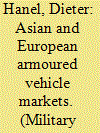

|
|
|
|
|
| Publication |
2012.
|
| Summary/Abstract |
With the start of the 21st century, the armed forces in Asia and Europe have been facing new demands as a result of radical changes in the security situation. In the foreseeable future, it is extremely unlikely that mentioned states will be threatened existentially by large - scale aggression using conventional means. Yet, safeguarding security and stability in both regions after the end of the Cold War and the need to meet global commitments for more exacting international conflict prevention and crisis management are leading to new tasks and demands placed on the Armed Forces.
|
|
|
|
|
|
|
|
|
|
|
|
|
|
|
|
| 2 |
ID:
145663


|
|
|
|
|
| Summary/Abstract |
‘Come, Make in India’, India’s Prime Minister has invited global firms to invest and manufacture in India and also to promote exports. As with this campaign, India has given a scope of promising growth to the companies which is also been seen to solve India’s multiple economic problems. Many countries have shown their interest to invest in India and one of them is South Korea. Now the question arises whether companies from South Korea in this competitive environment can mark their presence in India—a nation of cultural diversity, which can affect the initial start-ups, if ignored. Apart from the historical cultural ties, there are cross-cultural differences between South Korea and India. So, this paper aims to build up a study that brings together the parity and cross-cultural differences between South Korea and India. The paper opens with the discussion about the various historical, cultural and poetic relations to describe the scenario between the two countries, whereas for the analysis, a macro-meso-micro framework has been used to answer the research question. The three-level analysis helps this paper to see the overlooked influence of culture from a broader perspective. The results of the study reveal a list of cultural adaptations suited for South Korean start-ups to run businesses in India by avoiding the cultural threats and contribute to the existing literature. The study findings could be used by companies, marketers and practitioners to devise and re-vamp their strategies in India, and it will also serve as a cultural guide for them.
|
|
|
|
|
|
|
|
|
|
|
|
|
|
|
|
| 3 |
ID:
089912
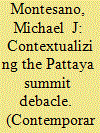

|
|
|
|
|
| Publication |
2009.
|
| Summary/Abstract |
The abrupt collapse of the ASEAN Plus Three and East Asian Summits at Pattaya on 11 April 2009 initiated four days of extreme political tension in Thailand. This tension both epitomized the current "red"-"yellow" polarization in Thai politics and society and represented the surface manifestation of deep pathologies in the Thai body politic. Four of these pathologies are the structure of the post-1997 economy, the figure of former Prime Minister Thaksin Shinawatra, the continuing war in the far south and concerns surrounding the end of the current reign. These pathologies leave Thailand in an incipient revolutionary situation, albeit one that must be clearly distinguished from the "revolution" that Thaksin tried to precipitate through street violence in April 2009. The seriousness of Thailand's pathologies notwithstanding, comparative perspectives offer the hope of peaceful progress towards the emergence of a new, more egalitarian Thailand.
|
|
|
|
|
|
|
|
|
|
|
|
|
|
|
|
| 4 |
ID:
162445
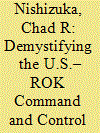

|
|
|
|
|
| Summary/Abstract |
The “transfer of wartime OPCON” from the United States to the Republic of
Korea, in conjunction with the termination of the obsolete Armistice Agreement,
may provide a unique opportunity for the Alliance to simplify and streamline
its command and control (C2) processes. The C2 structure in South Korea is
complicated by the coexistence of four distinct theater-level commands, the ROK
Joint Chiefs of Staff (JCS), United States Forces Korea (USFK), the Combined
Forces Command (CFC), and the United Nations Command (UNC), all of which
have a unique command structure and set of objectives. As the ROK continues
to grow stronger, both economically and politically, the four commands are
experiencing increasing difficulties synchronizing competing government policies.
The U.S. and ROK governments’ aptitude to address policy differences have a
direct impact on the ability of the four commands to achieve their end-states,
both individually and as a cohesive unit. This paper demonstrates that through the
reorganization of the Combined Forces Command and the elimination of conflicting
responsibilities emanating from the United Nations Command, the U.S.–ROK
Alliance could become more formidable by increasing simplicity, the unity of
command, and the span of control of the current C2 structure.
|
|
|
|
|
|
|
|
|
|
|
|
|
|
|
|
| 5 |
ID:
178379
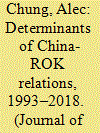

|
|
|
|
|
| Summary/Abstract |
This article seeks to explore the determinants of China-ROK relations during the period 1993–2018, employing event data and statistical analysis. The analysis found that China’s trade dependence on ROK, and vice versa, had a positive effect on China-ROK relations. The relations were also positively affected by China’s economic development. In contrast, the relations were negatively affected as China’s population aged and while conservative administrations governed ROK. The empirical findings of this article provide essential insights, identifying the factors that promote or hinder the development of cooperative China-ROK relations, suggesting guidelines to policymakers on both sides.
|
|
|
|
|
|
|
|
|
|
|
|
|
|
|
|
| 6 |
ID:
181410
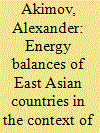

|
|
|
|
|
| Summary/Abstract |
The four developed East Asian economies - the People's Republic of China, Japan, the Republic of Korea, and Taiwan - form a major global center for fuel and energy consumption, with very limited reserves of fossil fuels other than coal in the People's Republic of China. The energy balances of these countries are similar in terms of a significant share of imports, including high-tech imports of liquefied natural gas, as well as a high share of coal. All these countries use modern technologies, including nuclear power and renewable energy sources, but the policies of these countries in focusing on modern technologies differ.
|
|
|
|
|
|
|
|
|
|
|
|
|
|
|
|
| 7 |
ID:
110361
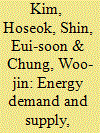

|
|
|
|
|
| Publication |
2011.
|
| Summary/Abstract |
The Republic of Korea (ROK) has enjoyed rapid economic growth and development over the last 30 years. Rapid increases in energy use-especially petroleum, natural gas, and electricity, and especially in the industrial and transport sectors-have fueled the ROK's economic growth, but with limited fossil fuel resources of its own, the result has been that the ROK is almost entirely dependent on energy imports. The article that follows summarizes the recent trends in the ROK energy sector, including trends in energy demand and supply, and trends in economic, demographic, and other activities that underlie trends in energy use. The ROK has been experiencing drastic changes in its energy system, mainly induced by industrial, supply security, and environmental concerns, and energy policies in the ROK have evolved over the years to address such challenges through measures such as privatization of energy-sector activities, emphases on enhancing energy security through development of energy efficiency, nuclear power, and renewable energy, and a related focus on reducing greenhouse gas emissions. The assembly of a model for evaluating energy futures in the ROK (ROK2010 LEAP) is described, and results of several policy-based scenarios focused on different levels of nuclear energy utilization are described, and their impacts on of energy supply and demand in the ROK through the year 2030 are explored, along with their implications for national energy security and long-term policy plans. Nuclear power continues to hold a crucial position in the ROK's energy policy, but aggressive expansion of nuclear power alone, even if possible given post-Fukushima global concerns, will not be sufficient to attain the ROK's "green economy" and greenhouse gas emissions reduction goals.
|
|
|
|
|
|
|
|
|
|
|
|
|
|
|
|
| 8 |
ID:
146022
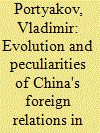

|
|
|
|
|
| Summary/Abstract |
On the basis of methods proposed by scholars of the Institute of Modern International Relations at Tsinghua University (PRC), the author examines the evolution of China's relations with leading countries of East Asia. A forecast is given concerning possible changes in the nature of the PRC's interaction with Vietnam, the U.S.A., Japan, Russia, and the Republic of Korea under the fifth-generation leaders headed by Xi Jinping.
|
|
|
|
|
|
|
|
|
|
|
|
|
|
|
|
| 9 |
ID:
101134
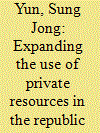

|
|
|
| 10 |
ID:
093905
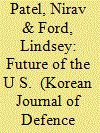

|
|
|
| 11 |
ID:
188168
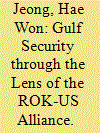

|
|
|
|
|
| Summary/Abstract |
An analysis of South Korea’s independent deployment of the Cheonghae Unit to the Strait of Hormuz sheds light on the fragmentation of media and political discourses in the country. Empirical evidence from five major South Korean newspaper outlets reveals that the South Korean government’s pre-emptive securitisation presents a wide gap in manifest and latent security interests between the state and society. Securitisation is debated with regard to the two interconnected questions of South Korea’s military deployment to the Middle East and the future of the Korean Peninsula – both of which are ultimately tied to the question of Seoul’s commitment to the US alliance.
|
|
|
|
|
|
|
|
|
|
|
|
|
|
|
|
| 12 |
ID:
100402
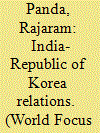

|
|
|
| 13 |
ID:
161732
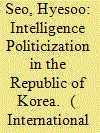

|
|
|
| 14 |
ID:
184029
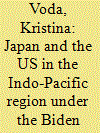

|
|
|
|
|
| Summary/Abstract |
This article analyzes the approaches of the United States and Japan to international political problems in the Indo-Pacific region at the beginning of the Joe Biden administration in 2021. It also aims to evaluate the perspectives of US-Japan cooperation in key areas. The article analyzes the policies of the United States and Japan toward China. Japan has supported Biden's approach to confront China on a wide range of issues. By actively participating in the US-China confrontation, the government in Tokyo aims to strengthen its position in rivalry with China. However, it will not be easy for Japan to preserve the achievements of the "warm" period in Japan-China relations in 2018-2020 in the economic and humanitarian spheres. The author also analyzes the approaches of the US and Japan to the situation on the Korean Peninsula, including the prospects for cooperation between Tokyo, Washington, and Seoul toward the DPRK. Difficult-to-resolve contradictions between Tokyo and Seoul in the short-term perspective will hinder large-scale cooperation of the parties with Washington. This article also analyzes the perspectives of the concept of "Free and open Indo-Pacific region."
|
|
|
|
|
|
|
|
|
|
|
|
|
|
|
|
| 15 |
ID:
100494
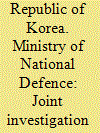

|
|
|
|
|
| Publication |
Korea, Ministry of National Defence, Republic of Korea, 2010.
|
| Description |
313p.
|
| Standard Number |
978897677711903300
|
|
|
|
|
|
|
|
|
|
|
|
Copies: C:1/I:0,R:0,Q:0
Circulation
| Accession# | Call# | Current Location | Status | Policy | Location |
| 055482 | 359.32209519/REP 055482 | Main | On Shelf | General | |
|
|
|
|
| 16 |
ID:
160650
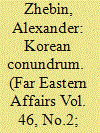

|
|
|
|
|
| Summary/Abstract |
This article examines reasons for the critical aggravation of the situation on the Korean Peninsula in 2017. The author comes to the conclusion that the United States, under the pretext of fighting proliferation of nuclear weapons, is trying to implement its own geopolitical plans in the APR, which in essence aim to maintain US military superiority in the region and deter Russia and China. Factors facilitating resumption of inter-Korean dialogue and its prospects, as well as outcomes of the summit of the DPRK leader and the US president, are considered.
|
|
|
|
|
|
|
|
|
|
|
|
|
|
|
|
| 17 |
ID:
179227
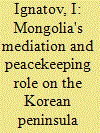

|
|
|
|
|
| Summary/Abstract |
This article examines the role of Mongolia as a mediator and peacemaker in the settlement of the conflict on the Korean Peninsula in line with its "third neighbor" foreign policy concept. The author shows why Mongolia enjoys the confidence of the parties involved in the conflict and is perceived by them as a most suitable mediator. He proceeds to analyze the actual mediation activities of the Mongolian leadership concerning Korea, including confidence-building measures with both states of the Korean Peninsula, organization of bilateral and multilateral meetings and negotiations on Mongolian soil, and the establishment of an international dialog platform in the form of the international conference known as the Ulaanbaatar Dialog on Northeast Asia Security. In conclusion the author points out that friendly relations of Mongolia with the Democratic People's Republic of Korea (DPRK) and the Republic of Korea gain special significance in the context of current deterioration of relations between North and South Koreas, since it is the Mongolian side that will be able to give support to the parties in conflict and their allies in resolving acute issues during the current crisis.
|
|
|
|
|
|
|
|
|
|
|
|
|
|
|
|
| 18 |
ID:
162798
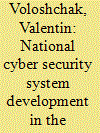

|
|
|
|
|
| Summary/Abstract |
This article offers a brief history of national cyber security system establishment in the Republic of Korea and discusses the timeline of hacker attacks on South Korean companies and government agencies. The author highlights the absence of a national cyber security strategy, inadequately elaborated laws and regulations, and inter-Korean political and military confrontation as major problems affecting the development of national policy in the field of information security.
|
|
|
|
|
|
|
|
|
|
|
|
|
|
|
|
| 19 |
ID:
170237
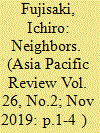

|
|
|
|
|
| Summary/Abstract |
This article discusses Japan-Republic of Korea relations since 1965 with focus on an issue that has returned to the forefront of debate. In a recently convened symposium between two leading think tanks, the chairmen of the two participating organizations proposed principles for improving Japan-ROK relations going forward.
|
|
|
|
|
|
|
|
|
|
|
|
|
|
|
|
| 20 |
ID:
124206
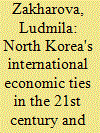

|
|
|
|
|
| Publication |
2013.
|
| Summary/Abstract |
The author offers an overview of whatever statistics is available about North Korea's economic ties with the rest of the world in the 2000s when its foreign trade expanded significantly. She examines the principal trends in commercial relations, cooperation in business investment, and projects North Korea is carrying out with its principal partners, China and the Republic of Korea, in the first place, and with Russia, too. In conclusion the author provides an outlook for North Korea's economic cooperation with other countries under the new leader.
|
|
|
|
|
|
|
|
|
|
|
|
|
|
|
|
|
|
|
|
|